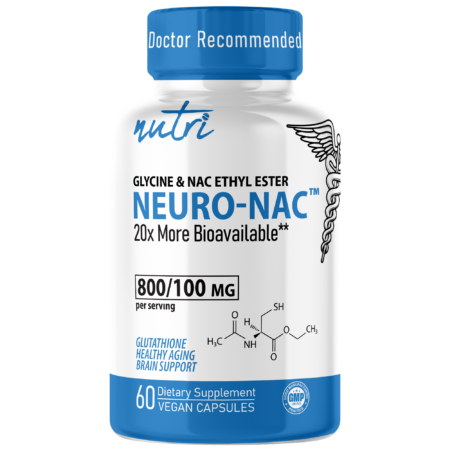We all know that antioxidants are good for our health. They prevent or slow the process of oxidation in our cells, combat free radicals, and limit oxidative stress. But if someone asked you to name the most important antioxidant, could you? You can after reading this article! Simply tell them that the most important antioxidant is glutathione, and here’s why:
Glutathione
Glutathione (GSH) is considered the Mother of all antioxidants. It is found in just about every cell in your body. Like all good mothers, glutathione never stops working on your behalf. It protects you from free radicals, combats oxidative stress, slows aging, and builds and repairs tissues. Furthermore, like a great mother, you can find GSH hard at work most prominently right where you need it: in your most vital organs, such as your heart, liver, kidneys, eyes, skin, and brain.
As you age, glutathione levels drop significantly. This leads to mitochondrial dysfunction, increased oxidative stress, and even genomic damage. Genomic damage is especially dangerous because it affects your DNA, both at the genetic level, causing genetic mutations, insertions, and deletions; as well as the chromosomal level, causing unbalanced chromosome pairs and translocation (broken chromosomes that transfer to form new, unbalanced pairs).
Glutathione Origins
Your body naturally synthesizes glutathione using cysteine, glycine, and glutamate, which are non-essential amino acids (amino acids that are produced by your body). Unfortunately, this critical antioxidant is constantly under attack, by free radicals, oxidative agents, and simply by aging.
As you age, GSH depletion is inevitable. Sadly, this leaves your cells vulnerable to both internal and environmental stressors by throwing your cellular thiol redox off balance. Basically, that means that your natural protections against oxidative damage are starkly reduced.
To make matters worse, GSH is only available in small amounts through your diet. This means that your GSH levels can be depleted much faster than they are synthesized. Part of this is because of the insufficient bioavailability of the amino acids that are converted into GSH—especially cysteine.
All of this sounds rather dire. However, we aren’t in the business of hopelessness! Happily, there is something you can do about it. Thank goodness for supplements!
Get More!
There are several options when it comes to getting more GSH. Here are five ways, with varied results:
Take Glutathione
The first option seems simple. To increase GSH levels, why not simply take oral GSH supplements? Unfortunately, it isn’t that simple. Studies that measure oxidative stress markers with and without glutathione supplements show no difference. Scientists believe that the reason for this is a digestive enzyme called y-glutamyl transpeptidase (GGT). GGT is thought to break down GSH in the gut.
Get the Ingredients
Once you realize that oral GSH supplements don’t work, the next step might be to take the ingredients for glutathione: cysteine, glycine, and glutamate. If your GSH levels are low, it makes sense to supplement with the amino acids that synthesize it. You know that cysteine is the first amino acid to become depleted, followed by glycine, and finally by glutamate. Why not start with cysteine, raise those levels with supplements, and move on from there? Sadly, these amino acids also exhibit poor bioavailability when taken orally.
Take Cysteine
This begs the question, can you focus on cysteine supplementation alone, since it is the most likely amino acid to be depleted? Once again, this option is derailed based upon bioavailability. Studies show that oral cysteine alone is significantly limited in its ability to increase cysteine levels at a cellular level.
Enter NAC (N-Acetyl-L Cysteine)
To solve the inability of oral cysteine to penetrate cells, scientists developed a better form of L-cysteine called N-acetyl-L-cysteine, or NAC. NAC is significantly more effective than cysteine when taken orally, taking it from no observable benefit to a bioavailability of 4-6%. However, while NAC is absorbed much more readily by the gut than L-cysteine, it is used up almost completely by the liver and kidneys, leaving smaller amounts for the plasma, the most beneficial target.
Enter NACET!
N-acetyl L-cysteine ethyl ester (NACET) is the cutting-edge form of supplemental cysteine that is superior to NAC in every way. NACET’s bioavailability blows that of NAC out of the water at a whopping 60-80%. This important distinction is due to the esterification process of NACET. Esterification disguises the L-cysteine, allowing it to sneak past your stomach, liver, and kidneys to penetrate the red blood cells and transport cysteine throughout your entire body. Furthermore, because NACET is both oil and water soluble, it can cross the blood brain barrier and be directly absorbed by your cells.
-
$29.99 — or subscribe and save 15% Add to cart
What does this mean for you? More of the antioxidant glutathione, and more protection against oxidative stress, free radicals, and aging. Remarkably, NACET increases plasma cysteine levels by 400-800%, which in turn increases GSH levels by 250%. This increase in GSH more than compensates for the fall in GSH levels that occurs naturally with age, supporting the health of every vital organ in your body and aiding in cell regeneration. In addition to NACET, our supplements contain glycine, selenium, and molybdenum—all designed to improve your GSH levels and support your health at a cellular level.
Now, when your friends ask you for your opinion on which supplement is the most important, you will be able to emphatically state that it is the mother of all antioxidants—glutathione.
You might be feeling concerned about what will happen as your GSH levels fall. Thankfully, GSH is easily supplemented. Don’t let those pesky free radicals do any more damage to your cells than they already have. Click here to order your supplements from Nature’s Fusions today.

